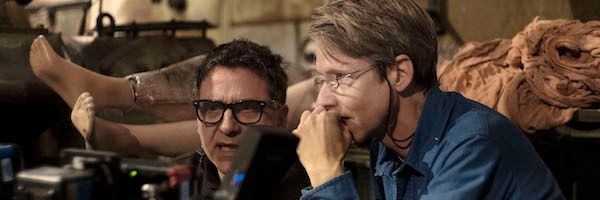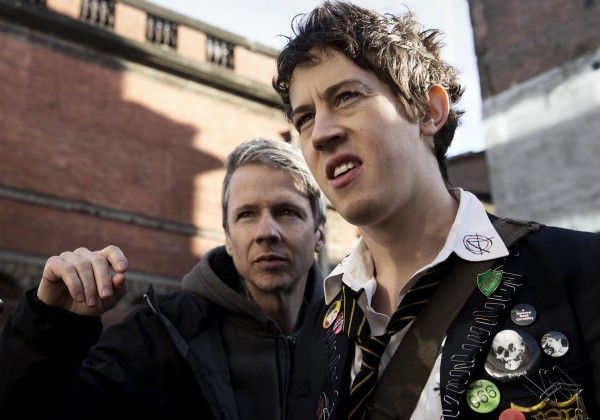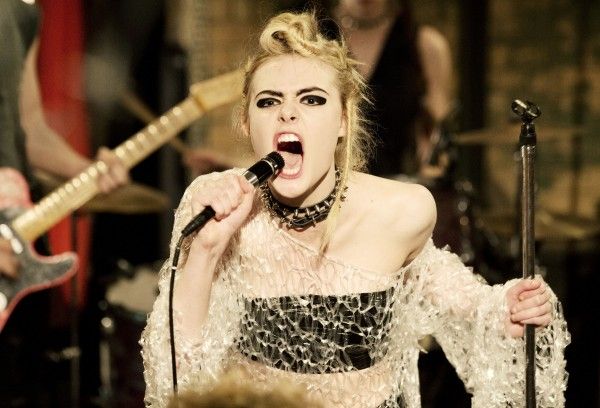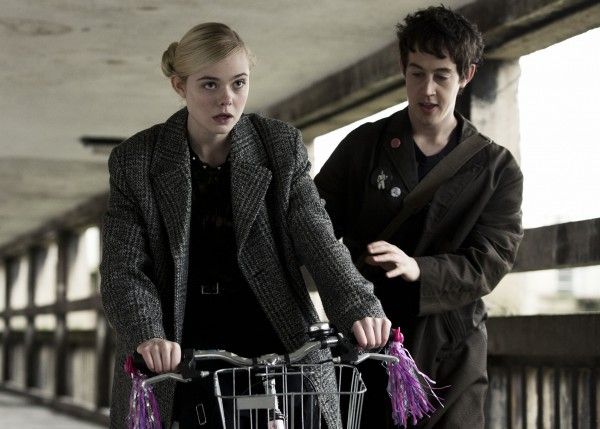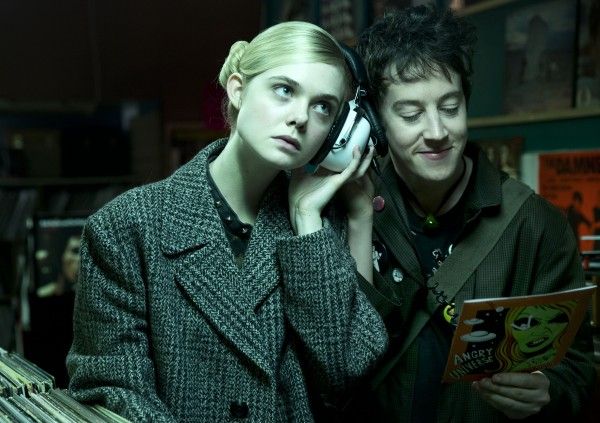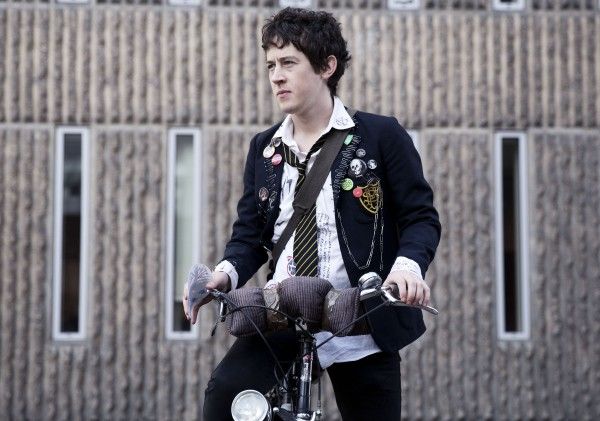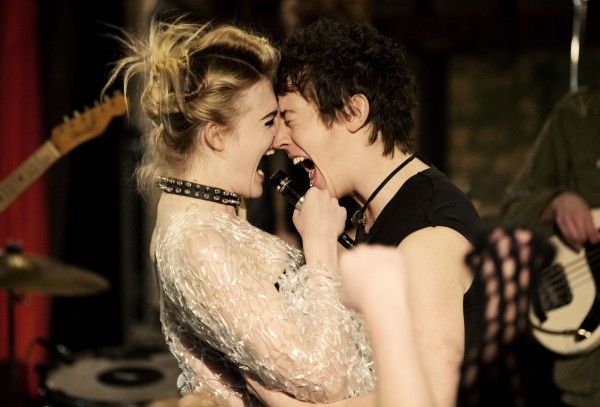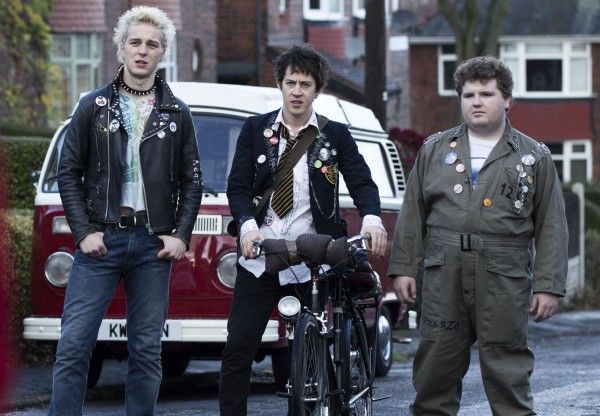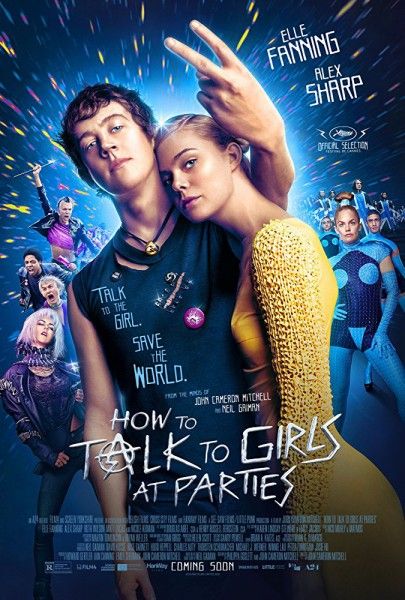Adapted from the short story by Neil Gaiman and directed by John Cameron Mitchell, the quirky teenage romance How to Talk to Girls at Parties follows a group of friends, as they unexpectedly meet an otherworldly colony in 1970s suburban England. It’s a Romeo + Juliet story, but with a punk boy (Alex Sharp) and an alien girl (Elle Fanning), on an adventure through punk clubs and alien hangouts in Croydon, with a great soundtrack of music and some wild latex fashion.
During this 1-on-1 phone interview with Collider, filmmaker John Cameron Mitchell talked about what made him want to tell this story, wanting to include little messages in all the stories he tells, taking a real do-it-yourself approach, creating a band and music for the film, and the great vibe that co-stars Alex Sharp and Elle Fanning brought to the set. He also talked about Hedwig and the Angry Inch finally coming to Criterion, why his creation has had such staying power, for nearly two decades, revisiting the songs for a new tour, The Origin of Love: Songs and Stories of Hedwig, and what he’s working on next.
Collider: It’s a real pleasure to talk to you! I’ve been a long time fan. I absolutely adore Hedwig, which I’m sure you hear a lot, but I would imagine that it never gets old to hear how much people love you and her.
JOHN CAMERON MITCHELL: It doesn’t!
What is it that made you want to make an alien punk romance, and could you have ever have imagined that that’s something you would be putting on your resume?
MITCHELL: Oh, sure! Next to Hedwig and Shortbus, this is mainstream, baby! I come from the ‘70s, and in the ‘70s, everything was available and everything was out there. Weird wasn’t a pejorative. It was just another thing. It was the age of Rocky Horror, The Man Who Fell to Earth, Liquid Sky and A Boy and His Dog. Those were all crazy, unusual sci-fi romances. This came from a Neil Gaiman story, and my producer was already starting the project and wooed me in to adopt it. It’s less of a child, and more of an adopted alien changeling child that I helped, along the way. I’ve always wanted to make a teenage love story. This is my YA romance, through my lens. Also, my mother is British, so it was really exciting to get to tell a British story and have it accepted in Britain. I like being able to use my British-trained sense of humor. So, I had a good time.
I love that Neil Gaiman has said that no one but you could have made this “mad, glorious, sex positive, punk positive film, which having seen it, I have to agree with. I can’t imagine anybody else handling this material because it just seems like it could have gone very wrong, very quickly.
MITCHELL: There’s the Hollywood version of this. I’m sure Todd Haynes could have had a great time with it. There might have been a darker version that Todd Solondz could have done. It’s a simple Romeo and Juliet story. Everyone is an alien, when you’re in love. Then, it ends up being less about first love and more about parenthood, weirdly. What does it mean to propagate the species? What does it mean to break up the monopoly? Why are the aliens jumping off of a building wearing British flags, to avoid contamination? What does closing the borders mean, emotionally as well as politically? That’s our little underlying criticism of a kind of nationalism that’s becoming quite popular now, which is very much about, “Let’s all die the same, together. Let’s all die alien, together. Let’s all die white, together. Let’s all die British, together.” My stories always have to have little messages and thoughts, and the main one is, evolve or die.
I also love that you created a punk bank for this, and they contributed original songs and even went out and played shows, which is just awesome. What was it like to bring the film to life, in that way, and put that together?
MITCHELL: It was a blast because I wasn’t really around in the late ‘70s, in a punk environment. I grew up in Britain during the glam years, and then discovered punk after I came out in the ‘80s, when there was more of a queer punk thing happening, which is what Hedwig came out of. It was really fun! Partly it was a do it yourself thing. Our film was punk, in the way that it was made. I got to put together a band, the way Malcolm McLaren and Vivienne Westwood put together Sex Pistols. We found a great front man. My friend Danny Fields, who used to manage The Ramones and Iggy Pop, suggested this guy Martin Tomlinson, who was in a band called Selfish Cunt. I saw some videos, and he was really out there. He was very queer Iggy. So, we created a band, called The Dyschords, and my composer Bryan Weller worked with him. He was my assistant, but we lost a composer, so he stepped in. It was very punk. It what just like, “Get somebody to do something, and write a song.”
Sandy Powell, who had been doing [Martin] Scorsese, did the alien costumes. She wanted to use rubber and do an alien geometric thing. They’re all based on the chakras, and the chakras have colors. And then, I told the actors to go and create a way of moving, based on their chakra. If it was crotch-oriented, then they’d go off and work on that. It was like summer camp, in the freezing British winter. Even the crew got into it. A lot of them are old punks themselves, and they loved what we were doing. They gave us extra hours, which they usually don’t do there, especially for Americans. So, I was adopted, as a half Brit. I also made sure to do my research to find out if an actor was gonna be a team player or a diva. I’ll always recast, if I hear they’re not gonna be cooperative and not gonna have fun with other people, but make it about them. Luckily, we had no bad apples. It was a great group of people. It was good to work with young and newer people, too, because they’re more excited and some of them are willing to stay a little longer. British actors also come out of the theater, so they’re more generous and less pretentious. People who only do film are a little odd because they never know when they’re gonna work. They don’t have a time clock the way that theater people do.
There was something so delightful and sweet about watching Alex Sharp and Elle Fanning. I thought they were just so adorable.
MITCHELL: They were ten years apart, but they had an instant vibe. He’s a British guy, who’s more in control of his life. Elle is young, vivacious, full of life, and giggling all the time, but completely professional when it’s time for work. She would tickle him out of his male British reserve, and he had his own well thought out, theater work ethic that would not harness her, so much as give a certain structure to her blinding light. Together, they were great. She also taught him how to relax in front of the camera because he had never done a film. He had sung before, so when they got to sing together, that helped to anchor her singing. Now, she’s singing more and more. I wrote a song for her. It was fun to write songs, for the first time. I didn’t really write them on Hedwig, so I was writing lyrics, and then some melodies for this, and sang on one song. We created a fake punk band for one day, called the Dyslexic Cnuts. We have a song called “Extraction.” It’s my fake British accent on that one.
You recently announced that Hedwig is coming to Criterion. First of all, it’s about time. Secondly, do you have any idea when that might happen, and is that something you’d been hoping for, for awhile?
MITCHELL: I have, but a lot of it has to do with the fact that Warner Bros. is the parent company, and they had to make an overall deal with Criterion. That was one that Criterion always wanted to do, but they just finally made the deal. I expect it to happen next year. There’s never been a DCP, which means a high-def digital transfer, which is why the film always has to play on prints. It keeps it punk rock, but it would be nice to have a new transfer, and then do some more documentary stuff on what’s happened since the movie. It’s been almost 17 years since it came out, and Hedwig has had a lot of journeys since then.
When you first created and brought Hedwig to life, could you ever have imagined that it really would still have the life today that it has?
MITCHELL: I didn’t really think about it. I just did whatever form I had in front of me. I could see how strongly people felt about it, in the moment, as they kept coming back to the show and would get tattoos. So, I knew that the depth of feeling was there, which made me think that it was gonna have a life, even if it was just to that small group of people. But I do love that the Broadway production has brought it to another group of young people, who can discover it on their own and not feel like they are being force fed it by some Marvel company, or something like that. The one tattoo I was gonna get, 25 years ago, was a Marvel character, and I’m glad I didn’t because it became a stupid franchise, and it would be a goddam Marvel universe franchise tattoo rather than something that meant something to me. The danger is that a company will take something that’s special to you and make it a product because they’re trying to sell it around the world and China, so it ends up being flattened out and simplified, but they can’t really do that with Hedwig. It’s not possible. She’s too specific and too special to actually be co-opted. No one has ever offered to take Hedwig and make her a superhero. There’s no money to be made, so she’s safe.
What’s it like to revisit the songs? Do they feel different when you perform them now?
MITCHELL: Yeah, different things about them move me. “Wicked Little Town” was more about a time when I felt trapped, but I guess you can be trapped anywhere, if you’re feeling not well. What’s great is that the metaphor works in different ways, at different times in your life. “The Origin of Love” myth is that there’s one person whose is your other half, but it doesn’t necessarily say that you should live with them. First love is often doomed. That’s what How to Talk to Girls tells you, too. First love is too intense. You’re too young. It’s very important, but it’s often doomed, and maybe it should be, so that you can learn for the next love. In a way, I think each of our love affairs is a brand on our bodies, and some people commemorate them with tattoos. All of these people are part of you. It might feel like they took a piece out of you, but that’s the half empty point of view. They teach you something, and maybe you don’t want to be taught that same lesson again. I think Hedwig remains powerful because it’s flexible enough to adapt any life to it. Ironically, it’s someone who’s completely unique that’s allowing you to do that. People were like, “What if you didn’t make the character gender queer? Maybe you’d get more eyes on it and more money.” But then, people wouldn’t have the same feeling.
I could take the sex out of Shortbus to make more money and get more people to see it, but then we don’t challenge the sexual fear that was the point of the film, in the first place. The film isn’t about sex, but it uses sex as a flash point in our life, that tells us when something else is wrong or right. It’s like DNA. You can look at it and say whether they have a disease or they’re healthy. You can see it in the way people have sex. Why censor it because it’s part of human existence? The fear of sex leads to violence. All police states have shut down sex. Trump is doing it now, even though he’s a fucking rapist, metaphorically or otherwise. Of course, he’s gonna pretend to be against any kind of non-traditional sexuality or sex work or transgender expression because he’s fucked up about sex already, and his relationship with women is caveman. To distract from that, you just attack the sexual outsiders. It'’s a perfect strategy that’s used throughout the ages.
So, what’s next for you? Is Anthem the thing that you’ll be working on?
MITCHELL: Yeah, that’ll be for the rest of the year. And I’m touring with a show, which is just a concert show, that’s called The Origin of Love: Songs and Stories of Hedwig. That will be me singing songs and telling whatever comes to mind. It’s really more of a rock show. I want to start in Australia and go to Asia, and do gigs, here and there, next year. That’s still being set up. It’s not a full tour. It’s more like a show here and there. That’s really to pay for my mom’s health care because she has Alzheimer’s and it’s very expensive care. It’s the mom tour. And then, I’ll be writing other stuff, but the podcast will be the main thing that I work on, this year. Hopefully, that will come out by the end of the year.
Well, I hope you bring the tour my way, at some point, because I’d love to see the show.
MITCHELL: I’m sure we’ll come there. We’ve just gotta get the right venue. I try to do at least a thousand seat-ish theater, so I can make it worth the trip, but hopefully, I’ll be there next year.
How to Talk to Girls at Parties opens in theaters on May 25th.

